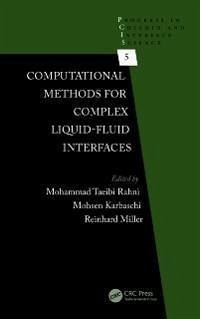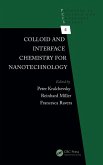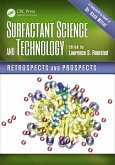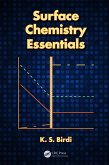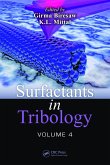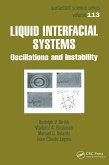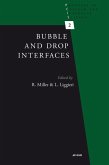Computational Methods for Complex Liquid-Fluid Interfaces (eBook, PDF)
Redaktion: Taeibi Rahni, Mohammad; Miller, Reinhard; Karbaschi, Mohsen
50,95 €
50,95 €
inkl. MwSt.
Sofort per Download lieferbar

25 °P sammeln
50,95 €
Als Download kaufen

50,95 €
inkl. MwSt.
Sofort per Download lieferbar

25 °P sammeln
Jetzt verschenken
Alle Infos zum eBook verschenken
50,95 €
inkl. MwSt.
Sofort per Download lieferbar
Alle Infos zum eBook verschenken

25 °P sammeln
Computational Methods for Complex Liquid-Fluid Interfaces (eBook, PDF)
Redaktion: Taeibi Rahni, Mohammad; Miller, Reinhard; Karbaschi, Mohsen
- Format: PDF
- Merkliste
- Auf die Merkliste
- Bewerten Bewerten
- Teilen
- Produkt teilen
- Produkterinnerung
- Produkterinnerung

Bitte loggen Sie sich zunächst in Ihr Kundenkonto ein oder registrieren Sie sich bei
bücher.de, um das eBook-Abo tolino select nutzen zu können.
Hier können Sie sich einloggen
Hier können Sie sich einloggen
Sie sind bereits eingeloggt. Klicken Sie auf 2. tolino select Abo, um fortzufahren.

Bitte loggen Sie sich zunächst in Ihr Kundenkonto ein oder registrieren Sie sich bei bücher.de, um das eBook-Abo tolino select nutzen zu können.
Computational Methods for Complex Liquid-Fluid Interfaces highlights key computational challenges involved in the two-way coupling of complex liquid-fluid interfaces. The book covers a variety of cutting-edge experimental and computational techniques ranging from macro- to meso- and microscale approaches (including pivotal applications). As example
- Geräte: PC
- mit Kopierschutz
- eBook Hilfe
- Größe: 96.99MB
Andere Kunden interessierten sich auch für
![Water at Interfaces (eBook, PDF) Water at Interfaces (eBook, PDF)]() Jordi FraxedasWater at Interfaces (eBook, PDF)48,95 €
Jordi FraxedasWater at Interfaces (eBook, PDF)48,95 €![Colloid and Interface Chemistry for Nanotechnology (eBook, PDF) Colloid and Interface Chemistry for Nanotechnology (eBook, PDF)]() Colloid and Interface Chemistry for Nanotechnology (eBook, PDF)51,95 €
Colloid and Interface Chemistry for Nanotechnology (eBook, PDF)51,95 €![Surfactant Science and Technology (eBook, PDF) Surfactant Science and Technology (eBook, PDF)]() Surfactant Science and Technology (eBook, PDF)46,95 €
Surfactant Science and Technology (eBook, PDF)46,95 €![Surface Chemistry Essentials (eBook, PDF) Surface Chemistry Essentials (eBook, PDF)]() K. S. BirdiSurface Chemistry Essentials (eBook, PDF)48,95 €
K. S. BirdiSurface Chemistry Essentials (eBook, PDF)48,95 €![Surfactants in Tribology, Volume 4 (eBook, PDF) Surfactants in Tribology, Volume 4 (eBook, PDF)]() Surfactants in Tribology, Volume 4 (eBook, PDF)173,95 €
Surfactants in Tribology, Volume 4 (eBook, PDF)173,95 €![Liquid Interfacial Systems (eBook, PDF) Liquid Interfacial Systems (eBook, PDF)]() Liquid Interfacial Systems (eBook, PDF)201,95 €
Liquid Interfacial Systems (eBook, PDF)201,95 €![Bubble and Drop Interfaces (eBook, PDF) Bubble and Drop Interfaces (eBook, PDF)]() Bubble and Drop Interfaces (eBook, PDF)56,95 €
Bubble and Drop Interfaces (eBook, PDF)56,95 €-
-
-
Computational Methods for Complex Liquid-Fluid Interfaces highlights key computational challenges involved in the two-way coupling of complex liquid-fluid interfaces. The book covers a variety of cutting-edge experimental and computational techniques ranging from macro- to meso- and microscale approaches (including pivotal applications). As example
Dieser Download kann aus rechtlichen Gründen nur mit Rechnungsadresse in A, B, BG, CY, CZ, D, DK, EW, E, FIN, F, GR, HR, H, IRL, I, LT, L, LR, M, NL, PL, P, R, S, SLO, SK ausgeliefert werden.
Produktdetails
- Produktdetails
- Verlag: Taylor & Francis
- Seitenzahl: 556
- Erscheinungstermin: 11. November 2015
- Englisch
- ISBN-13: 9781498722094
- Artikelnr.: 44204000
- Verlag: Taylor & Francis
- Seitenzahl: 556
- Erscheinungstermin: 11. November 2015
- Englisch
- ISBN-13: 9781498722094
- Artikelnr.: 44204000
Mohammad Taeibi Rahni received both his B.Sc and M.Sc from the University of Texas at Austin, USA, and his Ph.D from the University of Illinois, Urbana-Champaign, USA. He is a guest researcher at the Max Planck Institute of Colloids and Interfaces in Potsdam, Germany, and has a full-time appointment with Sharif University of Technology, Tehran, Iran. His main area of interest is computational fluid dynamics, with particular emphasis on the application of various computational techniques to interfacial phenomena. Mohsen Karbaschi earned his Ph.D in chemical engineering from Sharif University of Technology, Tehran, Iran, linked to the Max Planck Institute of Colloids and Interfaces in Potsdam, Germany. He has worked as a researcher at the Max Planck Institute of Colloids and Interfaces since 2011. His primary research interests lie in the area of surface science and multiphase flows, particularly with respect to computational fluid dynamics simulations and experimental analysis. Reinhard Miller studied mathematics at the University of Rostock, Germany, and did his Ph.D and habilitation at the Berlin Academy of Sciences, Germany. He currently works at the Max Planck Institute of Colloids and Interfaces in Potsdam, Germany. His scientific interests are experimental investigations of adsorption layers at liquid interfaces under dynamic conditions, interfacial rheology, stability of foams, and emulsions.
Thermodynamics of Adsorption at Liquid Interfaces. Nonequilibrium
Thermodynamics of Interfaces. Experimental Approaches and Related Theories.
Dynamics of Interfacial Layer Formation. Model-Based Computational
Approaches to Analyze Interfacial Problems. Molecular-Scale Computational
Techniques in Interfacial Science. Mesoscale Computational Techniques in
Interfacial Science: Lattice Boltzmann Method. Mesoscale Computational
Techniques in Interfacial Science: Smoothed Particle Hydrodynamics Method.
Macroscale Computational Techniques in Interfacial Science. Computational
Quantum Chemistry Applied to Monolayer Formation at Gas/Liquid Interfaces.
Molecular Dynamics Simulation of Surfactant Monolayers. Molecular Dynamics
Simulation of Droplet Spreading and Wettability Issues. Implementation of
Immersed Boundary Method to Study Interactions of Fluids with Particles,
Bubbles, and Drops. Mesoscale Lattice Boltzmann Model of Dispersions
Stabilized by Surfactants. Hybrid Numerical Method for Interfacial Flow
with Soluble Surfactant and Its Application to an Experiment in
Microfluidic Tip Streaming. Finite Element Computations for Dynamic
Liquid-Fluid Interfaces. Finite Element Techniques for the Numerical
Simulation of Two-Phase Flows with Mass Transport. Finite Volume/Finite
Area Interface-Tracking Method for Two-Phase Flows with Fluid Interfaces
Influenced by Surfactant. Approximate Analytical Solution via ADM and
Numerical Simulation of Acoustic Cavitation: Bubble Dynamics. Numerical
Solution, Stability, and Control of Acoustic Cavitation-Bubble Dynamics.
Liquid Bridge and Drop Transfer between Surfaces. Solutal Marangoni
Convection: Challenges in Fluid Dynamics with Mass Transfer. Hierarchical
Marangoni Roll Cells: Experiments and Direct Numerical Simulations in Three
and Two Dimensions. Modeling Foam Stability.
Thermodynamics of Interfaces. Experimental Approaches and Related Theories.
Dynamics of Interfacial Layer Formation. Model-Based Computational
Approaches to Analyze Interfacial Problems. Molecular-Scale Computational
Techniques in Interfacial Science. Mesoscale Computational Techniques in
Interfacial Science: Lattice Boltzmann Method. Mesoscale Computational
Techniques in Interfacial Science: Smoothed Particle Hydrodynamics Method.
Macroscale Computational Techniques in Interfacial Science. Computational
Quantum Chemistry Applied to Monolayer Formation at Gas/Liquid Interfaces.
Molecular Dynamics Simulation of Surfactant Monolayers. Molecular Dynamics
Simulation of Droplet Spreading and Wettability Issues. Implementation of
Immersed Boundary Method to Study Interactions of Fluids with Particles,
Bubbles, and Drops. Mesoscale Lattice Boltzmann Model of Dispersions
Stabilized by Surfactants. Hybrid Numerical Method for Interfacial Flow
with Soluble Surfactant and Its Application to an Experiment in
Microfluidic Tip Streaming. Finite Element Computations for Dynamic
Liquid-Fluid Interfaces. Finite Element Techniques for the Numerical
Simulation of Two-Phase Flows with Mass Transport. Finite Volume/Finite
Area Interface-Tracking Method for Two-Phase Flows with Fluid Interfaces
Influenced by Surfactant. Approximate Analytical Solution via ADM and
Numerical Simulation of Acoustic Cavitation: Bubble Dynamics. Numerical
Solution, Stability, and Control of Acoustic Cavitation-Bubble Dynamics.
Liquid Bridge and Drop Transfer between Surfaces. Solutal Marangoni
Convection: Challenges in Fluid Dynamics with Mass Transfer. Hierarchical
Marangoni Roll Cells: Experiments and Direct Numerical Simulations in Three
and Two Dimensions. Modeling Foam Stability.
Thermodynamics of Adsorption at Liquid Interfaces. Nonequilibrium
Thermodynamics of Interfaces. Experimental Approaches and Related Theories.
Dynamics of Interfacial Layer Formation. Model-Based Computational
Approaches to Analyze Interfacial Problems. Molecular-Scale Computational
Techniques in Interfacial Science. Mesoscale Computational Techniques in
Interfacial Science: Lattice Boltzmann Method. Mesoscale Computational
Techniques in Interfacial Science: Smoothed Particle Hydrodynamics Method.
Macroscale Computational Techniques in Interfacial Science. Computational
Quantum Chemistry Applied to Monolayer Formation at Gas/Liquid Interfaces.
Molecular Dynamics Simulation of Surfactant Monolayers. Molecular Dynamics
Simulation of Droplet Spreading and Wettability Issues. Implementation of
Immersed Boundary Method to Study Interactions of Fluids with Particles,
Bubbles, and Drops. Mesoscale Lattice Boltzmann Model of Dispersions
Stabilized by Surfactants. Hybrid Numerical Method for Interfacial Flow
with Soluble Surfactant and Its Application to an Experiment in
Microfluidic Tip Streaming. Finite Element Computations for Dynamic
Liquid-Fluid Interfaces. Finite Element Techniques for the Numerical
Simulation of Two-Phase Flows with Mass Transport. Finite Volume/Finite
Area Interface-Tracking Method for Two-Phase Flows with Fluid Interfaces
Influenced by Surfactant. Approximate Analytical Solution via ADM and
Numerical Simulation of Acoustic Cavitation: Bubble Dynamics. Numerical
Solution, Stability, and Control of Acoustic Cavitation-Bubble Dynamics.
Liquid Bridge and Drop Transfer between Surfaces. Solutal Marangoni
Convection: Challenges in Fluid Dynamics with Mass Transfer. Hierarchical
Marangoni Roll Cells: Experiments and Direct Numerical Simulations in Three
and Two Dimensions. Modeling Foam Stability.
Thermodynamics of Interfaces. Experimental Approaches and Related Theories.
Dynamics of Interfacial Layer Formation. Model-Based Computational
Approaches to Analyze Interfacial Problems. Molecular-Scale Computational
Techniques in Interfacial Science. Mesoscale Computational Techniques in
Interfacial Science: Lattice Boltzmann Method. Mesoscale Computational
Techniques in Interfacial Science: Smoothed Particle Hydrodynamics Method.
Macroscale Computational Techniques in Interfacial Science. Computational
Quantum Chemistry Applied to Monolayer Formation at Gas/Liquid Interfaces.
Molecular Dynamics Simulation of Surfactant Monolayers. Molecular Dynamics
Simulation of Droplet Spreading and Wettability Issues. Implementation of
Immersed Boundary Method to Study Interactions of Fluids with Particles,
Bubbles, and Drops. Mesoscale Lattice Boltzmann Model of Dispersions
Stabilized by Surfactants. Hybrid Numerical Method for Interfacial Flow
with Soluble Surfactant and Its Application to an Experiment in
Microfluidic Tip Streaming. Finite Element Computations for Dynamic
Liquid-Fluid Interfaces. Finite Element Techniques for the Numerical
Simulation of Two-Phase Flows with Mass Transport. Finite Volume/Finite
Area Interface-Tracking Method for Two-Phase Flows with Fluid Interfaces
Influenced by Surfactant. Approximate Analytical Solution via ADM and
Numerical Simulation of Acoustic Cavitation: Bubble Dynamics. Numerical
Solution, Stability, and Control of Acoustic Cavitation-Bubble Dynamics.
Liquid Bridge and Drop Transfer between Surfaces. Solutal Marangoni
Convection: Challenges in Fluid Dynamics with Mass Transfer. Hierarchical
Marangoni Roll Cells: Experiments and Direct Numerical Simulations in Three
and Two Dimensions. Modeling Foam Stability.
